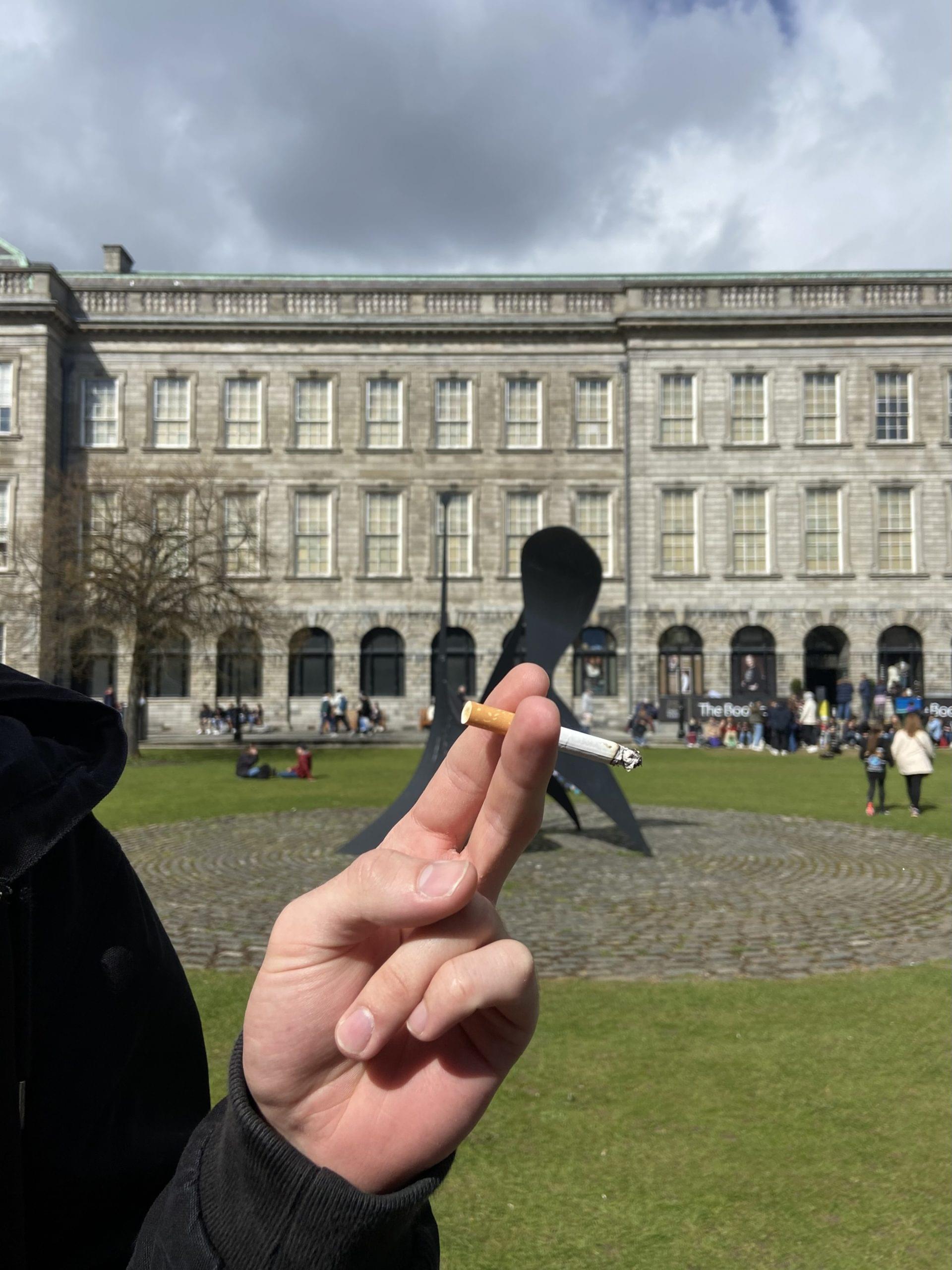Walking into campus through the Arts Block one morning, I was confronted by a screen declaring Trinity a “tobacco-free campus”. Not only was I surprised, having not heard this once in my six months of studying here, but my confusion was further justified once I walked past the arts block and saw the revolving cast of smokers standing outside. Trinity may declare itself tobacco free, but it is certainly not in practice.
“The disparity in attitudes to smoking can be a culture shock for international students.”
The social culture of smoking among students is not relegated to Workman’s Wednesdays or walks home from the Pav, but extends to campus as well. Many seem more eager to ask a stranger for a lighter outside the arts block than they do to raise their hand in a lecture or tutorial, and smoking is undoubtedly a regular sight around Trinity. This may be normalised in our college and perhaps Dublin at large, but student smoking is not an accepted part of all universities, and for many international students it is a facet of student life that they did not expect on arrival in Ireland. Not only is smoking not as popular, but it is actively looked down upon by students in many areas, particularly America. Vivien Sweet, a first year student from New York, explained that “smoking, at my school at least, was openly deemed to be a ‘disgusting’ habit. Coming to Trinity felt like taking a step backwards, health-wise.” Education, along with strict laws and fines, have created a culture that shuns smoking and no longer associates it with socialising or an aspirational aesthetic. The disparity in attitudes to smoking can be a culture shock for international students; Laragh Scharf, from Vermont, found that “it was odd to see smoking as more of a social activity here – especially on campus”, though both students mentioned that they had found vaping to be common among peers both at home and in Dublin
“Awareness of the dangers of smoking seems to have led our generation of students not into avoidance of cigarettes, but instead into a liminal space of engaging with and denying the practice at once.”
The idea of ‘social-smoking’ is a concept that comes up in any conversation on the topic among my age group. A social smoker might not buy a pack or even own a lighter, but will bum a cigarette off someone any time they’re on a night out, or take a drag on a friend’s smoke after a lecture. Social smokers might not consider themselves ‘smokers’ in the true sense, because they do not feel addicted, and their smoking habit oscillates as their socialising does. It is this category that, from my experience of Trinity, seems to capture a large proportion of the student population. Of course, there are many students who smoke regularly and in an addicted manner, but this is certainly a minority compared to the former category. However, it seems this group is largely left out of statistics (they likely would not be able to quantify how much or how often they smoke, since it is so variable), and are not targeted by anti-smoking advertising or advice. Awareness of the dangers of smoking seems to have led our generation of students not into avoidance of cigarettes, but instead into a liminal space of engaging with and denying the practice at once.
When smoking is inextricably linked with socialising, environment is key. If smoking is not limited to the smoking area at a club, but campus too is an area where it is considered sociable to smoke, social smokers may be engaging in this habit more regularly than they otherwise would. Trinity has been a purportedly Tobacco Free Campus since March 2019, with designated areas for students still wishing to smoke. However, this rests on “compliance”, according to the website. Though I am not advocating for enforcement of this rule, it seems the website’s suggestion – that if you see someone smoking outside of a designated smoking area you hand them a leaflet on smoking – is laughably unrealistic. Smoking still occurs and pretending that campus is ‘tobacco free’ may only serve to exacerbate issues associated with smoking such as littering, with fewer places for students to discard cigarette butts. Most importantly, students cannot be compliant with a policy they are unaware of. When I expressed surprise to friends that Trinity was in fact ‘tobacco free’, they were similarly shocked. Of course, many know about the policy and choose to flout it, and I’m sure if more were made aware of it this would still be the case. However, if new students were told about Trinity’s tobacco free status and the reasoning behind it (including environmental as well as health factors) upon arrival, perhaps some would choose differently. When the campaign to make Trinity tobacco free was ongoing, 71% of students polled agreed with making Trinity a tobacco free campus, so there is not a lack of receptivity. Trinity’s tobacco free status could be used to weaken the ties between on-campus socialising and smoking, whereas it is currently a fact many students are unaware of.
Ultimately, the culture of smoking on campus and by students around Dublin is pervasive, but is not unchangeable. The attitudes of international students demonstrate how views towards smoking can be adapted for the better but also for the worse, with those I spoke to saying that Dublin had “lessened [their] fear of cigarettes significantly”, and that if they were to smoke, they would feel more comfortable doing so in Dublin than back home. Trinity’s tobacco free campus currently seems to be a loose concept of anti-smoking, floating in the background, barely visible, like the plumes of smoke outside the arts block. Yet, college could, and should, leverage it to alter the perception of smoking and its social connotations among students both on campus and off.






